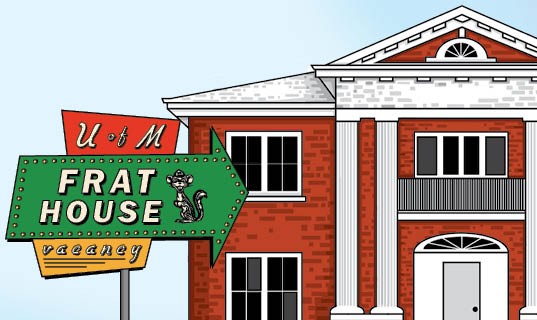Hundreds of college students spill from the fraternity houses lining University Avenue on Friday nights. During the week, the houses are emptier than normal.
Despite the fact 11 percent of the University of Minnesota’s students participate in Greek life, some Greek houses struggle to attract members to fill their rooms.
“It could be personal preference,” said Ronald Atkinson, the Interfraternity Council & National Pan-Hellenic Council advisor for the University. “For example, when I was an undergraduate I loved my fraternity brothers but had no desire to live with them only because I preferred living alone.”
The development of multiple luxury apartment complexes around campus may also keep members from living in fraternity houses, said Chi Psi President Dylan Marvel and Phi Sigma Kappa President Garrett Caddes in an email.
“Frat houses are older and do not typically have the same amenities as some of the new apartments popping up around campus,” Caddes said.
Other apartments scattering the borders of the University campus are often the first choice for students, pushing fraternities to adjust their prices to stay competitive, Caddes said.
If a fraternity doesn’t meet a certain quota for the number of individuals living in the house, their budget decreases, Marvel said, adding that chapters make the most money from members who pay house dues.
The house dues tie in programming, utilities, and meal plans in addition to rent prices, Atkinson said.
Fewer residents result in less money available for formals, parties, house maintenance and philanthropies, Marvel said.
Most chapter houses for sororities and fraternities have the capacity to fit 25 to 30 tenants, Atkinson said.
Fraternities with less than 35 members experience the most difficulty in filling rooms in the traditionally large buildings, Marvel said.
Unlike the fraternities, sororities are unfamiliar with this problem, said Kayla Brown, 2016 president of Lambda Delta Phi. The girls are encouraged to live in the house for two years to get to know the other girls on a deeper level.
“Really, if you don’t have a good number of live-ins, that can really cause your house to flop,” Marvel said.








